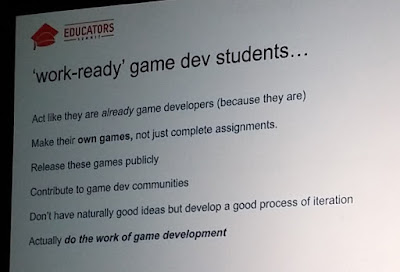This is part two of my notes on GDC 2019, read the first part here.
Follow the DOTS: Presenting the 2019 roadmap
Intrigued by Unity's keynote I decided to attend this session. This was a rather high-level talk with lots of pointers to other content (for example lot's of talks where held at Unity's own booth). Main take away for me were the ECS samples that can be found on github. There is also a new transform system coming in 2019, curious for that as well.
At the keynote it was announced that Havok Physics will be integrated with Unity, together with a custom, completely C# based physics solution from Unity themselves. Personally I trust the in-house version a bit better atm, but maybe Havok will be more performant after all? It's just weird to have the two options.
There is also a new API in the works to control the unity update loop. Not sure why, since I think it will only complicate things.
At the moment the C# job system and the Burst compiler are released. ECS is due later in 2019 and then it's the plan to transfer all other internal systems over to ECS by the end of 2022.
It is sneakily never mentioned anywhere but I asked during the Q&A session: yes, Havok will still require a separate license.
Creating instant games with DOTS: Project Tiny
Build upon DOTS, the goal of of project tiny was to create a 2d web game smaller than 100kb. For that they stripped the editor from anything that was too much for the project, "tiny mode". For scripting they introduced TypeScript... Why??? We just got rid of JavaScript! Luckily they announced that they're going to switch this back to C# again. It's unclear to me they even bothered with TypeScript.
The goal in the end is that you can select the libraries you need for your game and remove all the others. Tiny mode will then be called "DOTS mode". It is only targeted for web, but mobile platforms will be added later. A bit more info can be found here.
Cool part of "DOTS mode" is the runtime runs in a sperate process, even in the editor. This means it can even run on another device, while you're working in the editor! It also implies that there will be no need anymore to switch platforms; conversion of assets will happen at runtime.
Another part of the DOTS improvements is the vast improvement of streaming, awake and start times have all but been eliminated, so that sounds promising too.
IMGui in the editor is also completely deprecated, UI will build with UIElements.
Looking forward to these changes, I might test this with a 2D GIPF project I'm working on...
Procedural Mesh Animation with non-linear transforms
This talk by Michael Austin was serious cool! He illustrated how we could implement easy wind shader code with non linear transforms. But then he went on and made extremely nice visual effects with only very few lines of math in the vertex shader.
I had not the time to note it all down thoroughly enough to reproduce it here, but I really recommend checking out this talk on the vault! If I find anything online I'll add it here and my fingers are itching to get started on a demo :)
Cementing your duct tape: turning hacks into tools
Not really my field of interest, but the speaker was Mattias Van Camp, ex-DAE student but (more importantly) ex-Kweetet.be artist! He even mentioned Kweetet during his introduction, the logo was on the screen!
He then defined the term "duct tape" he uses in his talk: duct tape is a hack that you throw away. What follows were two examples of duct tape code they had to write at creative assembly to work with massive amounts of assets. Both of the examples boiled down to the DRY principle, but this time applied to art assets instead of code or data. They used the Marmoset Toolbag to generate icons from max files for example, all automatically. Continuous integration FTW!
Are Games Art School? How to Teach Game Development When There Are No Jobs
Next I attended another session of the educators summit. Speaker Brendan Keogh made a case that game schools are art schools, meaning that once you graduate there are practically no jobs available. There were some interesting stats:
The sources for that data can be found here.
He then continued to make a case that we should train "work-ready" game dev students.
I'm a real fan of the first sentence on that slide! Students often do not realize this and we should tell them this indeed.
Another good take-away for me was the notion to not have the students in the first year create a game like X (which we actually do in Programming 2 and Programming 4) but instead have them make a game about Y. And Y can be anything, so you're not only restricted to games. The students will much more likely create something truly unique.
Something I should mention too: "Videogames aren't refrigerators". Just so you know.
Belgian Games Café
We quickly visited IGDA's Annual Networking Event, which was nice but not very interesting. After that we went to the Belgian Games Café, there were good cocktails, but no real beer :). Nice venue!
And it was cool to meet so many Belgian devs. And then the party got started once David started showing of his retro DJ skills :)





No comments:
Post a Comment